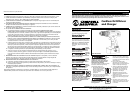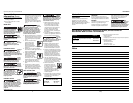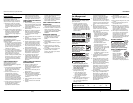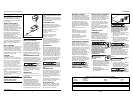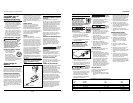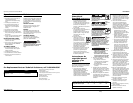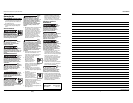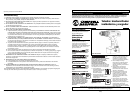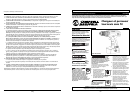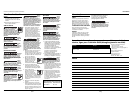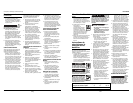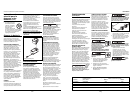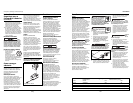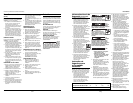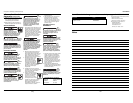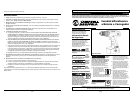
Para Ordenar Repuestos o Asistencia Técnica, Sírvase Llamar al
Distribuidor Más Cercano a Su Domicilio
Sirvase darnos la siguiente información:
- Número del modelo
- Código impreso
- Descripción y número del repuesto según la lista de repuestos
Número del
Descripción Repuesto
Dirija toda la correspondencia a:
Campbell Hausfeld
Attn: Customer Service
100 Production Drive
Harrison, OH 45030 U.S.A.
CARGA RÁPIDA
Cargador – 23.4V (para baterías de 19.2V) DG029300AV
Batería – 19.2V DG029200AV
Mantenimiento
MANTENGA LIMPIA LA
HERRAMIENTA
Todas las piezas de plástico deben
limpiarse con un paño húmedo.
NUNCA use solventes para limpiar
piezas de plástico. Podrían disolverse o
dañar el material de alguna otra
manera.
LA HERRAMIENTA NO
FUNCIONA
En caso de que la herramienta no
funcione, asegúrese de que la batería
esté cargada e instalada en el taladro.
BATERÍA
La batería se descargará por si sola sin
dañarse si se guarda por largos
períodos de tiempo y es posible que
necesite recargarla antes de usarla.
SERVICIO TÉCNICO
Para obtener información con relación
al funcionamiento o reparación de
este producto, sírvase llamar al
1-800-424-8936.
El
servicio
de la herramienta debe ser realizado
sólo por personal de reparaciones
calificado. El servicio o mantenimiento
realizado por personas no calificadas
puede provocar riesgo de lesiones.
31 Sp
DG141900CD
Notas
Maximum Size Drill Bits
Drill Model Max. Bit Size
DG141900CD 3/8” (.375)
General Safety
Information (Cont’d.)
9. Keep all nuts, bolts and screws tight
and ensure equipment is in safe
working condition.
10.Do not put hands near or under
moving parts.
WORK AREA
Do not operate a power tool
in an explosive atmosphere,
such as in the presence of
flammable liquids, gases, or dust.
Power tools create sparks which may
ignite the fumes or dust.
Keep
work
area clean and well lighted. Cluttered
benches and dark areas invite
accidents.
Keep
bystanders, children, and visitors away
while operating a power tool.
Distractions can cause you to lose
control.
ELECTRICAL SAFETY
Recharge
this
battery-operated tool only with the
charger specified for the battery. A
charger suitable for one type of battery
can create a risk of fire when used with
another battery.
Do not
expose
power tools to rain or wet conditions.
Water entering a power tool will
increase the risk of electric shock.
Use this
battery-
operated tool only with its designated
battery pack. Use of any other batteries
may create a risk of fire.
Avoid body contact with
grounded surfaces such as
pipes, radiators, ranges, and
refrigerators. There is an
increased risk of electric shock if your
body is grounded.
PERSONAL SAFETY
Do not
misuse
this product. Excessive exposure to
vibration, work in awkward positions,
and repetitive work motions can cause
injury to hands and arms. Stop using
any tool if discomfort, numbness,
tingling, or pain occur, and consult a
physician.
2
Operating Instructions and Parts Manual
1. Stay alert, watch what you are
doing, and use common sense when
operating a power tool. Do not use
tool while tired or under the
influence of drugs, alcohol, or
medication. A moment of
inattention while operating power
tools may result in serious personal
injury.
Avoid
accidental starting. Be sure switch is in
the locked or off position before
inserting battery pack, making any
adjustments, changing accessories, or
storing the tool. Carrying tools with
your finger on the switch or inserting
the battery pack into a tool with the
switch on invites accidents.
2. Remove adjusting keys or wrenches
before turning on the tool. A key or
wrench attached to a rotating part
of the tool may result in personal
injury.
3. Do not overreach. Keep
proper footing and
balance at all times.
Proper footing and
balance enable better
control of the tool in unexpected
situations.
4. Always work in a well-ventilated
area. Wear an OSHA-approved dust
mask and safety glasses.
5. Hold tool by insulated
gripping surface when
performing an operation
where the tool may
contact hidden wiring.
Contacting a “live” wire will make
exposed metal parts of the tool
“live” and shock the operator.
6. Keep hands away from rotating
parts.
7. Use clamps or another practical
way to secure the workpiece to a
stable platform. Never hold work in
your hand, lap, or against other
parts of your body when drilling.
TOOL USE AND CARE
Do not
use tool
if switch does not turn it on or off. Any
tool that cannot be controlled with the
switch is dangerous and must be
repaired.
Ensure
that the
switch is in the off position before
inserting battery pack. Inserting the
battery pack into the saw with the
switch on invites accidents.
Under
abusive
conditions, liquid may be ejected from
the battery. Avoid contact. If contact
accidentally occurs, flush with water. If
liquid contacts eyes, seek medical help.
Liquid ejected from the battery may
cause irritation or burns.
1. When battery pack is not in use,
keep it away from metal objects
such as paper clips, coins, keys,
nails, or screws that can make a
connection from one terminal to
another. Shorting the battery
terminals together may cause
sparks, burns, a fire, or damage to
the battery.
2. This tool must NOT be modified or
used for any application other than
that for which it was designed.
Do not
force the
tool. Use the correct tool for your
application. The correct tool will do the
job better and safer at the rate for
which it is designed.
3. Maintain tools with care. Keep
cutting tools sharp and clean.
Properly maintained tools with
sharp cutting edges are less likely
to bind and are easier to control.
4. Check for misalignment or binding
of moving parts, breakage of parts,
and any other condition that may
affect the tool’s operation. If
damaged, have the tool serviced
before using. Many accidents are
caused by poorly maintained tools.
5. Use only accessories that are
recommended by the manufacturer
for your model. Accessories suitable
for one tool may create a risk of
injury when used on another tool.
6. Some wood contains
preservatives which can
be toxic. Take extra care
to prevent inhalation and
skin contact when
working with these materials.
Request and follow all safety
information available from your
material supplier.
7. Store tools out of reach of children
and other untrained persons. Tools
are dangerous in the hands of
untrained users.
www.chpower.com



